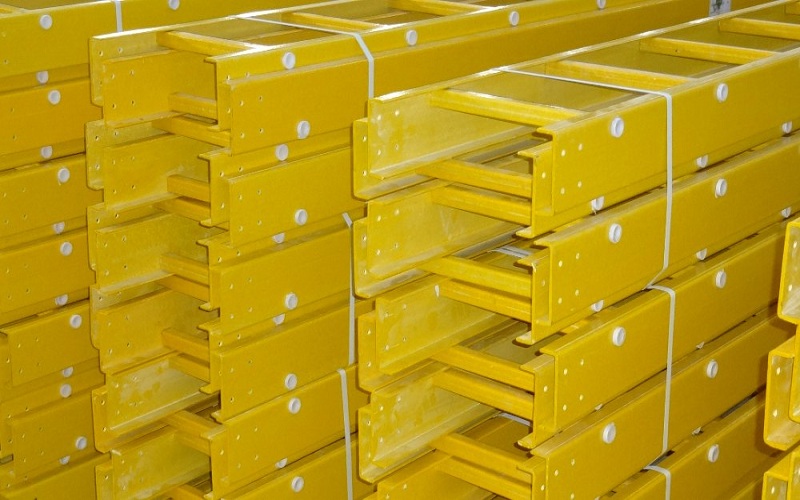Introduction
India’s FRP cable tray exporters are slaying it on the global platform, churning out cable management products that are rugged, budget-friendly, and long-lasting. Fiber Reinforced Plastic (FRP) cable trays are taking center stage from traditional metal trays because they don’t rust, they’re extremely lightweight, and they can withstand insanely harsh environments. The internation market for such trays is poised at approximately USD 760 million in 2025 and projected to blow past USD 1 billion by 2033, increasing at a decent 7.8% annually. This piece delves into what makes Indian exporters stand out, ranging from trendy designs to green sentiments and a knack for finding the right spots.
Indian manufacturers are definitely going beyond mere production they are addressing the needs of the businesses in the oil and gas, telecom, and renewable energy sectors. Their core values include custom manufacturing, rigorous global standards compliance, and environmental conservation, which have made them the preferred suppliers of large-scale projects all over the globe. Here’s a breakdown of why they’re running the game.
Innovative Design and Customization
Indian exporters are experts in designing FRP cable trays precisely what industries require, however difficult the task. Their emphasis on clever design and bespoke options is why they’re a class apart.
- Pultrusion: The Magic Behind Strong Trays
The pultrusion process is the backbone of FRP cable tray production in India, a continuous technique which has delivered consistent quality and high strength. Indian manufacturers such as Ercon Composites and Aeron Composite employ automated pultrusion plants to manufacture glass fiber reinforced plastic (GFRP) trays carrying 60-65% glass content that are more durable and corrosion resistant. This technique enables the manufacturer to have exact control over the tray size and load capacity that can be used in so many different fields, such as offshore platforms and chemical plants. In comparison with traditional steel trays, FRP trays are non-conductive and are more resistant to harsh environments, which Indian exporters highlight as they use these features to comply with the international safety standards such as NEMA FG-1 and IS 6746 that are going to be accepted.
- Custom Fits for Any Job
Indian exporters truly excel at customization. Consider Chemitech Group—they have an entire range of fittings such as bends, tees, and reducers that perfectly fit into complex cable configurations. This is a big deal for sectors such as IT and telecommunication, which consume more than 40% of the world FRP cable tray market in 2025 due to the data center boom. Elements such as adjustable splice plates and trefoil clamps allow customers to adjust electrical configurations on the fly, which is a godsend for quick-turn projects such as power plants or urban infrastructure. Indian trays are constructed to meet any project’s specifications, large or small.
Uncompromising Quality Standards
For India’s FRP cable tray exporters, quality is not merely a buzzword, it is the whole deal. They are committed to meeting stringent global standards, thus establishing their reputation in the Asian, African, and Middle Eastern markets.
Meeting Global Standards
The Indian manufacturers rigorously ensure that their trays comply with the specifications NEMA FG-1 for load strength and IS 6746 for fire resistance. Being a case in point, the Indian company Ferrotech ensures that its trays are tested for flammability under ASTM-D-635, thus they can be used safely even in places like nuclear power plants. Those certifications are not just for fun; they are what attract top engineers and contractors to Indian products. Indian trays that conform to UL and IEC regulations can also gain access to places with stringent rules, becoming a trustworthy option for international projects.
Durability in Harsh Environments
FRP trays are designed to cope with conditions that would destroy metal trays. Exporters in India design trays that joke about acidic chemicals, salty sea breeze, or blistering heat. Ercon Composites delivered GRP cable trays to Oman’s LIWA Plastic Petrochemical Complex in 2018, demonstrating they can cope with wild corrosive environments. With non-conductive construction and UV-resistant finish, these trays are safe to use for high-voltage applications and designed to endure the elements in outdoor installations such as solar farms. Customers receive durability they can rely on, regardless of the environment.
Cost-Effective Manufacturing and Supply Chain Efficiency
India’s exporters of FRP cables trays leverage the nation’s production heft to churn out excellent trays by the ton at prices that undercut everybody else. This combination of low price and excellent quality is a major reason they’re dominating worldwide.
Sophisticated Manufacturing That Saves Money
Advanced pultrusion factories allow firms such as Fiber Tech Composite Pvt. Ltd. to manufacture trays in bulk, saving money without compromising accuracy. FRP trays have a weight of roughly one-third that of steel and one-fourth that of aluminum, slashing shipping and installation expenses time and again. Setup can often be handled by one employee, as opposed to the heavy lifting required for metal trays. By procuring fiberglass and resins locally, exporters such as Satyam Composites maintain costs of production constant, which they pass on to customers without compromising on quality.
Strategic Export Networks
Indian exporters have supply chain management to a tee, delivering to more than 10 nations from Africa to Asia-Pacific. Fibrograts provides 500+ corporate customers over 20 Indian states and ships worldwide, leveraging India’s trade agreements and port facilities to get there quick. This narrow supply chain is critical for such projects as metro rail infrastructure or wind farms, where timing is not an option. Close relationships with international distributors allow Indian traders to access trays where they are needed, when they are needed.
Sustainability and Eco-Friendly Practices
As the planet goes big on sustainability, Indian FRP cable tray exporters are rising to the occasion with green practices that ring true. Their emphasis on green materials and processes puts them ahead.
Eco-Friendly Trays for a Better Planet
FRP trays are greener than metal already, requiring less energy to produce and being fully recyclable. Companies such as Chemitech Group Hawkins utilize UV-stabilized resins and environmentally friendly composites to produce longer-lasting trays that are more environmentally friendly. They are ideal for renewable energy applications such as solar panels and wind farms, where they resist extreme weather. By reducing the number of replacements, FRP trays minimize the environmental impact of large projects, a huge attraction for customers who are environmentally conscious.
Reduced Maintenance and Longevity
FRP trays are designed to last, which is wonderful for budgets and the earth. In contrast to steel trays that require round-the-clock maintenance to battle rust, FRP trays are nearly maintenance-free, even in challenging conditions. Along beaches where salt air devours metal for breakfast, FRP trays just keep on going for decades. That translates to fewer replacements, less landfill waste, and reduced costs—a win for those industries with performance goals balanced by environmentally friendly objectives.
Strategic Market Expansion and Industry Focus
Indian FRP cable tray exporters possess a keen sense of high-growth industries and geographies, capitalizing on trends such as digitalization, solar energy, and urbanization to increase their presence.
Owning IT and Telecom
The IT and telecom industry, driven by the boom in data centers, consumes more than 40% of FRP cable tray demand in 2025. Exporters such as Aeron Composite provide trays with deadly fire resistance and electrical insulation, ideal for safeguarding dense cable networks in data centers. India’s own domestic IT sector, attracting USD 227 billion in FY22, provides exporters with a good test bed to fine-tune their products before exporting them. This expertise guarantees Indian trays are up to the high standards of large tech players.
Growth in Renewable Energy and Infrastructure
The international movement towards renewable energy is a gold mine for Indian exporters. FRP trays are the best fit for solar and wind power projects, withstanding harsh conditions like champs. India’s manufacturing economy that is poised to reach USD 1 trillion by 2025 drives domestic cable management demand, providing exporters a solid foundation to break into foreign markets. Infrastructure projects in emerging economies, such as metro lines and industrial complexes, drive demand for hard-wearing and economical trays round the clock.
Challenges and Adaptive Strategies
Although Indian FRP cable tray exporters have been very successful, they still encounter some difficulties. These include the unpredictable market for the raw materials and the competitors from the international businesses. However, the strategic implementation of these adaptive strategies by them guarantees their growth.
Keeping Costs Steady
Price fluctuations in resins and fiberglass hurt, thanks to supply chain glitches around the world. Exporters such as Satyam Composites counter by producing raw materials internally, reducing dependence on imports and keeping costs consistent. Acquiring top-grade material locally guarantees consistent production without going over budget.
Competing with Global Manufacturers
Big players such as Eaton and Schneider Electric own part of some markets, but Indian exporters keep pace with bespoke solutions at competitive prices. They concentrate on niche requirements—such as corrosion-proof trays for chemical plants—capturing niche segments. Partnering with local distributors in geographies such as the Middle East and Southeast Asia strengthens their global position.
Case Studies: Indian Exporters Making a Global Impact
Indian FRP cable tray exports are making headlines with large projects, demonstrating that they can deliver when the stakes are high.
- Fiber Tech Composite Pvt. Ltd.’s Middle East Breakthrough
Fiber Tech Composite Pvt. Ltd has been a bright spot, delivering FRP cable trays to high-profile projects in the Middle East, including UAE oil and gas plants. Their corrosive-resistant trays, designed to meet the challenges of harsh desert environments, have been instrumental in ensured cable management, helping them earn a good reputation for performance under stress.
- Ercon Composites’ Oman Success
In 2018, Ercon Composites supplied Oman’s LIWA Plastic Petrochemical Complex with GRP cable trays, a project that required materials robust enough for super corrosive conditions. The seamless supply and installation of the trays placed India on the Middle East’s industrial map.
- Fibrograts’ Global Hustle
With more than 30 years of experience under its belt, Fibrograts ships to 10 nations, supplying everybody from telecom to oil and gas. Its Gujarat plant cranks out customized trays in a hurry, satisfying customer requirements while being economical. This adaptability makes Fibrograts a go-to company for infrastructure jobs all over the globe.
What’s Next: The Future Looks Bright
The future’s bright, Indian FRP cable tray exporters, as they face it with new technology and market trends on the horizon. Improved flame retardants and intelligent design are driving FRP trays into more demanding applications.
Next-Gen Materials
High-performance, halogen-free, low-smoke resins have been developed in order to make FRP trays safer for places with high-risk spots such as tunnels and data centers. Such improvements not only maintain the leading position of Indian exporters but also enable them to be compatible with the industry need without any difficulty.
Getting Smart with Infrastructure
The growth of intelligent buildings and IoT-enabled projects is creating a buzz for FRP trays with integrated monitoring, such as sensors for temperature or load monitoring. Methods such as Building Information Modeling (BIM) are facilitating design and installation more efficiently, enabling exporters to hit project-specific requirements.
Grabbing Global Opportunities
With Asia-Pacific dominating the market for cable trays due to rapid growth, Indian exporters are in a sweet spot. Oil, gas, and infrastructure plans in Africa and the Middle East are ready to be capitalized on. By embracing sustainability and India’s manufacturing prowess, the exporter stands to capture an even larger piece of the global pie.
Conclusion
FRP cable trays India have truly established a strong reputation internationally — and justifiably so. They combine clever, creative designs with robust quality and affordable production. What distinguishes them is their adoption of advanced technology such as pultrusion, while maintaining adherence to global standards. They’re not merely fulfilling requirements — they’re truly addressing genuine issues for sectors that require dependable, durable solutions.
Be it renewable energy, data centers, or intelligent infrastructure, these suppliers understand how to provide precisely what is required: robust, customizable, and environmentally friendly cable trays that are affordable. And what’s the most exciting aspect? Their efforts extend beyond production. From design to final delivery, they provide comprehensive assistance — establishing them as reliable collaborators globally. As the worldwide drive for digital transformation and sustainable construction intensifies, India’s FRP cable tray exporters are ideally situated to take the lead.



